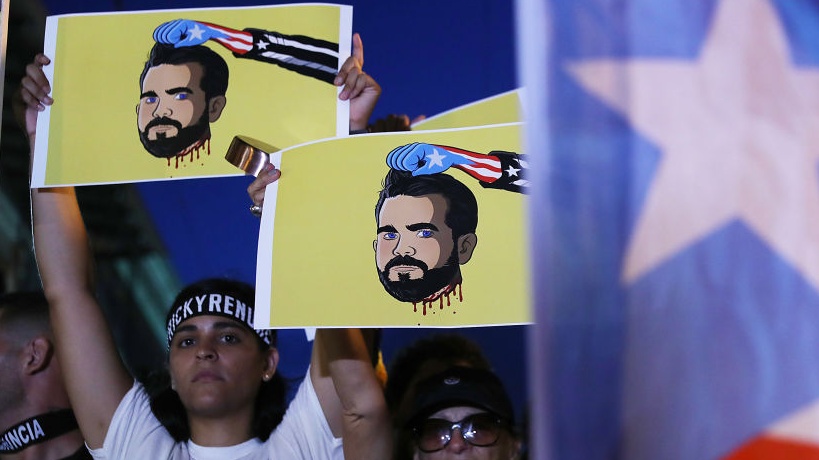Puerto Rico Governor Ricky Rossello announced Wednesday night that he will step down after citizens called for his resignation over the past few weeks. On Monday, over 1 million people stormed the streets demanding the governor to step down after leaked chats revealed illegal behavior. That protest deemed "The Great March" is one of the largest demonstrations in the island’s history. Protests around the world, from New York to Australia, have surfaced to show solidarity for Puerto Ricans. Although the leaked chat messages seem to be the tipping point for the protests, Puerto Rico has long awaited Rossello's resignation and has been organizing against him since he took office.
Here’s a bit more information on what's going on in Puerto Rico.
1.
Rossello says he will leave office on August 2nd.
Initially, after protests broke out, Rossello said he would not seek re-election in the 2020 gubernatorial race. Now, after overwhelming calls for his resignation over the past two weeks and a spark in worldwide attention, Rossello has announced that he will step down altogether. The announcement came through a video broadcast on Facebook Wednesday night. Many Puerto Rican residents protested outside of his mansion Wednesday night, shouting, "Ricky Renuncia!" (Ricky Resign!). Rossello was also expecting impeachment hearings to go into effect starting Thursday.
2. The FBI arrested six of his officials for committing corruption with political funds.
A raid was conducted July 10 by the FBI in Puerto Rico, resulting in the arrest of two Puerto Rican government officials and three business partners, including the former Education Secretary Julia Keleher and former leader of the Puerto Rico Health Insurance Administration Angela Avila-Marrero. The corruption charges were brought forth after over $15 million of federal funding was given to unqualified, politically-connected contractors. These government leaders have denied funds to the people of Puerto Rico, particularly after Hurricane Maria hit the island in 2017. Rossello condemned these officials publicly for the corruption scandal. Although Rossello was not implicated in the corruption arrests, many called for his resignation due to his lack of oversight in his administration.
3. Puerto Rico was already battling an imploding debt crisis, causing budget cuts and price increases.
The island has struggled to be on solid financial ground since 2006. The Great Recession, as well as Hurricane Maria, caused the government to seek funds in order to meet the financial needs of the people. In 2017, the island filed for bankruptcy for its $74 billion debt. Last year, Rossello reached a deal with the U.S. Treasury to access community disaster loans to pay for the recovery of Puerto Rico. Prior to this deal, the U.S. Treasury was reluctant to allow access to these funds to Puerto Rico after suspicions of false financial record-keeping. Along with the restricting of its debt to reduce payment amounts by half, the Puerto Rican government also sought funds from Wall Street banks, resulting in a $1 billion payout. The Puerto Rican government has told its residents that it could not supply money for its people due to lack of funds, while also cutting its budget, closing schools and increasing the cost of living.
4. His father was also involved in a corruption scandal when he was the governor of Puerto Rico.
In the 1990s, the administration of Pedro Rossello, Ricky’s father, was implicated in a corruption investigation. The scandal involved 17 of his officials, who took government funds for themselves and their political party, the New Progressive Party. This scandal is similar to Ricky’s, where over $4 million was given to the government by contractors who paid for government contracts with their companies. Pedro Rossello was not implicated in the scandal nor did he step down during his term.
5. A chat between Ricky and a government official revealed problematic comments.
An 899-page document was leaked to Puerto Rico’s Centro De Periodismo Investigativo (Center for Investigative Journalism), which included chat messages between Ricky Rossello and 10 of his cabinet members on a messaging app called Telegram. The document contained misgynostic, homophobic, fatphobic and other problematic messages, including insults made towards several key figures, such as Ricky Martin, and jokes made about those who died in Hurricane Maria.
The people now await the fate of their new government. Many are requesting for a democratic system to be put in place so the people can elect their own leaders. It is unclear whether Puerto Rican residents will continue to protest until his removal is complete. For now, they are basking in the victory of popular power and grassroots organizing to take down a ruler whose government brought destruction to the island’s society.
